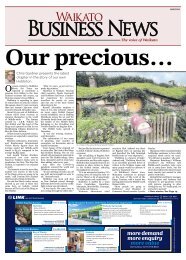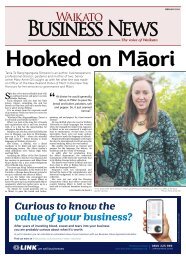Grey Power November 2015
The Grey Power Magazine is a prime national news source for its readers – New Zealand men and women over 50. Circulated quarterly to more than 68,000 members, Grey Power Magazine reports on the policies of the Grey Power Federation, and the concerns of the elderly, backgrounding and interpreting official decisions which affect their lives.
The Grey Power Magazine is a prime national news source for its readers – New Zealand men and women over 50. Circulated quarterly to more than 68,000 members, Grey Power Magazine reports on the policies of the Grey Power Federation, and the concerns of the elderly, backgrounding and interpreting official decisions which affect their lives.
Create successful ePaper yourself
Turn your PDF publications into a flip-book with our unique Google optimized e-Paper software.
NATIONAL GREYPOWER MAGAZINE » NOVEMBER <strong>2015</strong> 11<br />
Future of funding local government<br />
How councils fund their activities has<br />
been a source of contention since<br />
local government was established.<br />
In attempts to find more effective and efficient<br />
means to fund community services, local governments<br />
- or central government through third<br />
party execution - have delivered at least one report<br />
a decade since the 1950s.<br />
The most recent effort was created earlier this year<br />
with Local Government New Zealand’s (LGNZ’s) 10<br />
point plan; incentivising economic growth and strong local<br />
communities.<br />
This recent report is premised on economic, demographic<br />
and population profile changes that make the<br />
existing funding regime anachronistic.<br />
An effective and efficient funding structure for local<br />
government requires both improved innovation and efficiency<br />
and likely a modification to the Local Government<br />
Act (LGA) to allow local councils to utilise tools that most<br />
effectively and fairly distribute the cost burden of community<br />
infrastructure and services.<br />
Local government has capital assets valued at around<br />
$120 billion (roughly the same as central government).<br />
This seems like a large amount of infrastructure, but<br />
local government has the responsibility for 16 resource<br />
areas including roading, 3 waters, environmental management,<br />
emergency management and recreation and<br />
sport, among others.<br />
The value of this infrastructure and service is not<br />
small - and based on the kind of local government you<br />
live in - may be skewed toward roading and water.<br />
Local governments in New Zealand manage more<br />
than 80,000 kilometres of roads (88 percent of the New<br />
Zealand’s roads), and 3 waters infrastructure has a value<br />
of more than $35 billion.<br />
As such, roughly 44 percent of all local government<br />
operating expenditure goes toward operating these resources<br />
alone.<br />
However, inquiry is often oriented toward whether<br />
the funding sources are fit for purpose and if execution<br />
is efficient. As community members age, the impact of<br />
a tax based on property value (rather than income) can<br />
be burdensome. Further, with populations in some 30<br />
communities expected to decline over the next 20 years,<br />
are ratepayers getting the most from their<br />
contribution?<br />
These and other questions<br />
are what prompted Local<br />
Government New Zealand<br />
to research the<br />
appropriateness<br />
and effectiveness<br />
of how and<br />
where we collect<br />
our rates.<br />
In analysis,<br />
it was<br />
difficult to<br />
find another<br />
country that<br />
has as few<br />
alternatives<br />
to raise local<br />
revenue.<br />
The LGA<br />
prohibits local<br />
governments<br />
from collecting<br />
sales or income<br />
tax, or to source<br />
other opportunities<br />
including a regional<br />
fuel tax or a visitor levy.<br />
LGNZ’s approach, which<br />
makes its report a bit different<br />
from others, was to premise a discussion<br />
on incentivised economic success.<br />
Incentives that are mutually beneficial for central and<br />
local government, and meet the needs of business and<br />
volunteer interests, are likely to be supported in possible<br />
trial and potential adoption.<br />
LGNZ’s 10 point plan is intended as a conversation<br />
starter.<br />
There may be other options and opportunities that<br />
exist for local government to appropriately support its<br />
citizens. Each community is unique, but the<br />
LGA has a “one size fits all” approach<br />
and local government must work<br />
with every stakeholder and resource<br />
to resolve its uncertain<br />
future.<br />
FUELING<br />
YOUR SAVINGS!<br />
UP TO<br />
8 ¢<br />
OFF<br />
per litre<br />
Challenge is the only fully owned and<br />
operated Kiwi service station network supported<br />
by <strong>Grey</strong><strong>Power</strong>. That’s why when you fill up at your local<br />
Challenge station, you’ll save up to 8 cents per litre on fuel!<br />
FAR_04328<br />
At all Challenge service stations nationwide.<br />
www.challenge.net.nz


















